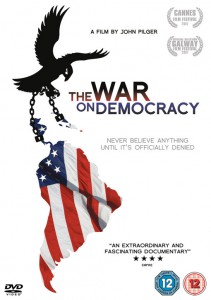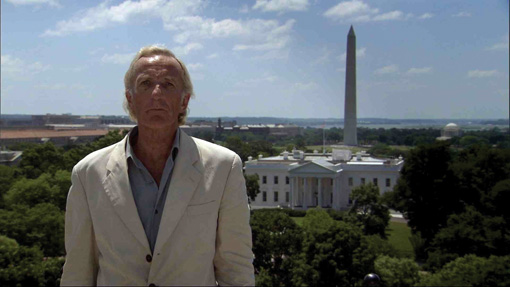2008. GB. DVD (Region 2 PAL). 94 minutes. Lions Gate Home Entertainment. Certificate 12. Price: £19.99.
 About the Author: Mike Wayne teaches Film, Television and Media Studies at Brunel University. His publications include Dissident Voices: The Politics of Television and Cultural Change (1998), Political Film: the Dialectics of Third Cinema (2001), The Politics of European Cinema: Histories, Borders, Diasporas (2002), Understanding Film: Marxist Perspectives (2005), Television news, politics and young people: Generation disconnected? (2010, (with Julian Petley, Craig Murray and Lesley Henderson) and Marx’s Capital For Beginners (2011). He co-directed a feature length documentary about the Venezuelan revolution, Listen To Venezuela (www.listentovenezuela.info).
About the Author: Mike Wayne teaches Film, Television and Media Studies at Brunel University. His publications include Dissident Voices: The Politics of Television and Cultural Change (1998), Political Film: the Dialectics of Third Cinema (2001), The Politics of European Cinema: Histories, Borders, Diasporas (2002), Understanding Film: Marxist Perspectives (2005), Television news, politics and young people: Generation disconnected? (2010, (with Julian Petley, Craig Murray and Lesley Henderson) and Marx’s Capital For Beginners (2011). He co-directed a feature length documentary about the Venezuelan revolution, Listen To Venezuela (www.listentovenezuela.info).
John Pilger has made more than 55 documentaries for television over a period of almost 40 years. They have taken viewers to people and places that are often far away, connecting them to British audiences, often via critical scrutiny of British foreign policy or that of its allies, especially the US and Israel.
The War on Democracy is Pilger's first major documentary film to be released in cinemas. It has his trademark characteristics of lucid investigation coupled with an understanding of the broader dynamics. But it also has a bigger storytelling canvas than Pilger's usual work.

(Image: Lions Gate)
It takes as its subject matter the foreign policy of the US state as it has been carried out in Latin America since the end of the Second World War. US foreign policy has in recent years come under a critical scrutiny not seen since the war in Vietnam. Michael Moore’s Fahrenheit 9/11 (2006) focused specifically on the build up to and social interests served by the Bush administration’s drive to war in Iraq in 2003. Eugene Jarecki’s 2005 documentary Why We Fight took a broader historical look at the role of the US military industrial complex in the last 50 years while David Leaf and John Scheinfeld’s The US vs John Lennon (2006) revisits the Vietnam war period via the politicisation of the ex-Beatle.
These films in turn are part of a broader explosion in documentary filmmaking that have taken a critical look at corporate capitalism and consumerism. Think: Supersize Me (2004), The Corporation (2003), Walmart: The High Cost of Low Price (2005), Enron: The Smartest Guys In The Room (2005), and Sicko (2007). These films have tackled the big issues of American life which television news, shackled by years of deeply ingrained journalistic conformity to power, has shied away from.
The War on Democracy however focuses on the effects of US foreign policy on the people who are the recipients of Washinton politicians’ attention. The crimes against humanity which this foreign policy has caused have gone either unreported by most Western media, celebrated as victories by the conservative press or criticised by the liberal media as the excesses of particular administrations.
Pilger's film shows that these crimes are systematic and ongoing. Behind the ‘war’ on democracy lies a war around the very meaning of the word. For many right wing politicians, democracy is virtually the same thing as the ‘free’ market, even though that has meant supporting coups and military dictatorships throughout Latin America. What frightened US elites, both political and economic, was a rather more authentic grass-roots democracy that has flourished in Latin America in between the jackboot of US backed fascism and military rule. Such grass roots democracy recovers the meaning of the word from Ancient Greece, rule by the people (demos).

The War on Terrorism (Lions Gate Home Entertainment)
The War on Democracy opens with a long introduction into what has been happening in Venezuela since the 1998 election of President Chavez. Within the western media, a combination of imperial arrogance (nothing progressive can come from outside the west) and contemporary interests (no alternative to global, unrestrained free market capitalism must be allowed to rear its head) has meant that Chavez and his Bolivarian revolution have received little in the way of thoughtful coverage. The exception is another documentary, The Revolution Will Not Be Televised (2003), which was an eye-witness account of the attempted (US backed) coup against Chavez in 2002.
Inverting reality, the typical coverage of Chavez in the UK makes the lazy and casual assumption that he is some kind of dictator, even though he has won numerous elections with a large percentage of the popular vote (certainly larger than George Bush ever has). Time Out recently described Chavez as a dictator, while the BBC’s John Sweeney recently broadcast a 30 minute documentary that aligned itself very closely with the views of Venezuela’s elite internal opposition.
In the opening Venezuela section of his film, Pilger by contrast adopts a comical mock interest in and sympathy for the plight of the elites as they bemoan their relative loss of political power. But as he looks back to the past, and covers the story of progressive change and repression in such countries as Guatemala, Bolivia, El Salvador and Chile, the tone darkens considerably.
The rich, the powerful and the agents of repression who Pilger interviews display an almost psychotic ‘disconnect’ between the political and economic forces they support
The rich, the powerful and the agents of repression who Pilger interviews display an almost psychotic ‘disconnect’ between the political and economic forces they support and the torture, murder, poverty, misery and injustice which result from those forces. Long-term alignment with the interests of capitalism seems to be bad for your mental health.
Perhaps a warning to this effect ought to be put on commodities, just as in Venezuela articles of the new constitution are put on the packaging of basic foodstuffs as a sign of the entry of the masses into political life.
The film spans the gulf between people like Duane Clarridge, chief of the CIA's Latin American bureau in the 1980s, and ordinary people struggling for justice. Clarridge, now retired, shorn of his media minders and the need to be diplomatic, speaks the real language of imperial power unadorned with all that rhetorical guff about ‘democracy’.
Against that, ordinary people, in moving testimony, recall the torture and murder that they endured or witnessed as repression kicked in. And just as remorselessly, resistance returns. This resistance, Pilger concludes, as Sam Cooke's ‘A Change Is Gonna Come’ plays us out, is ‘unbeatable’.
Mike Wayne E-mail: michael.wayne@brunel.ac.uk